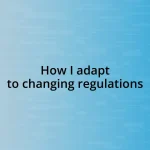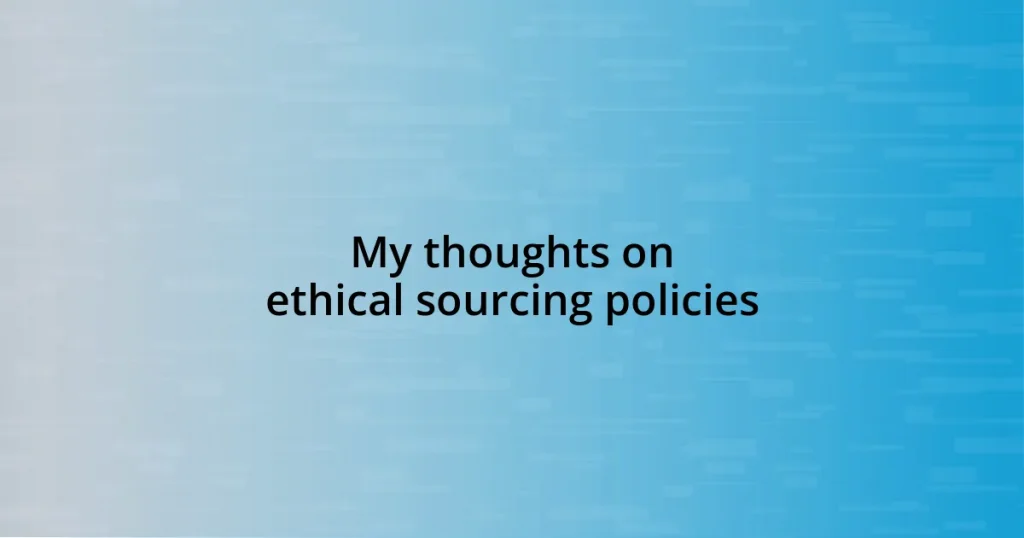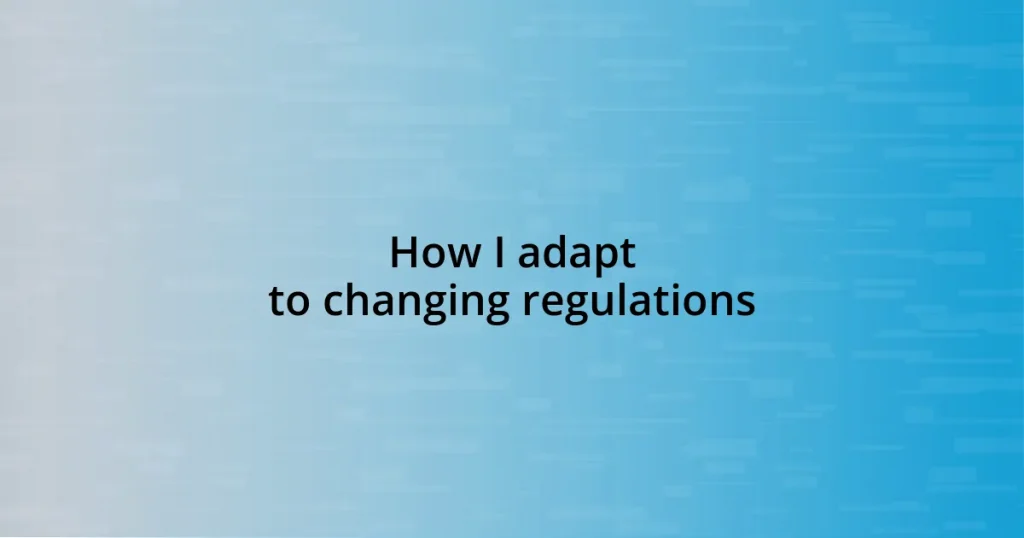Key takeaways:
- Ethical sourcing policies promote responsibility in supply chains, safeguarding human rights and the environment while building consumer trust and brand loyalty.
- Key components include fair labor practices, environmental sustainability, and supply chain transparency, which contribute to a brand’s identity and community impact.
- Implementing effective strategies such as strong supplier relationships, employee education, and measurable goals enhances accountability and fosters positive change.
- The future of ethical sourcing emphasizes technology for transparency, collaboration among brands, and rising consumer demand for ethical practices, urging companies to prioritize ethics in their identity.
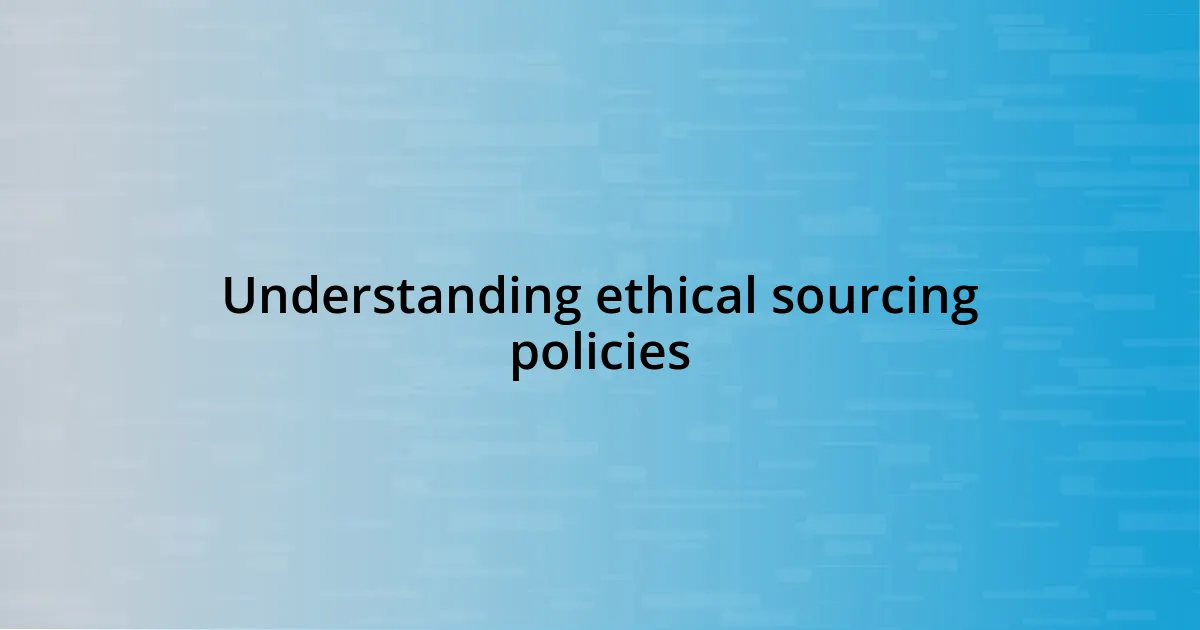
Understanding ethical sourcing policies
Ethical sourcing policies are essentially guidelines that businesses follow to ensure that the products they procure are made in a socially responsible and environmentally sustainable manner. I remember the first time I learned about this concept during a workshop; it was eye-opening to see how sourcing practices can impact communities and ecosystems. Have you ever thought about where your favorite products come from?
When a company commits to ethical sourcing, it transcends mere compliance with laws; it often reflects a deeper value system that prioritizes fairness and integrity. I once spoke with a small business owner who felt a profound responsibility to support local artisans instead of opting for cheaper imports. That emotional pull can lead to vibrant, sustainable communities—and isn’t it inspiring to think that your choices can make a difference?
Understanding ethical sourcing isn’t just about the end product but the entire journey it takes. I find it fascinating how transparency in the supply chain not only builds consumer trust but also encourages vendors to adopt better practices. Don’t we all want the brands we support to contribute positively to the world? The ripple effect of ethical sourcing can create a wave of change, benefiting not just consumers but society as a whole.
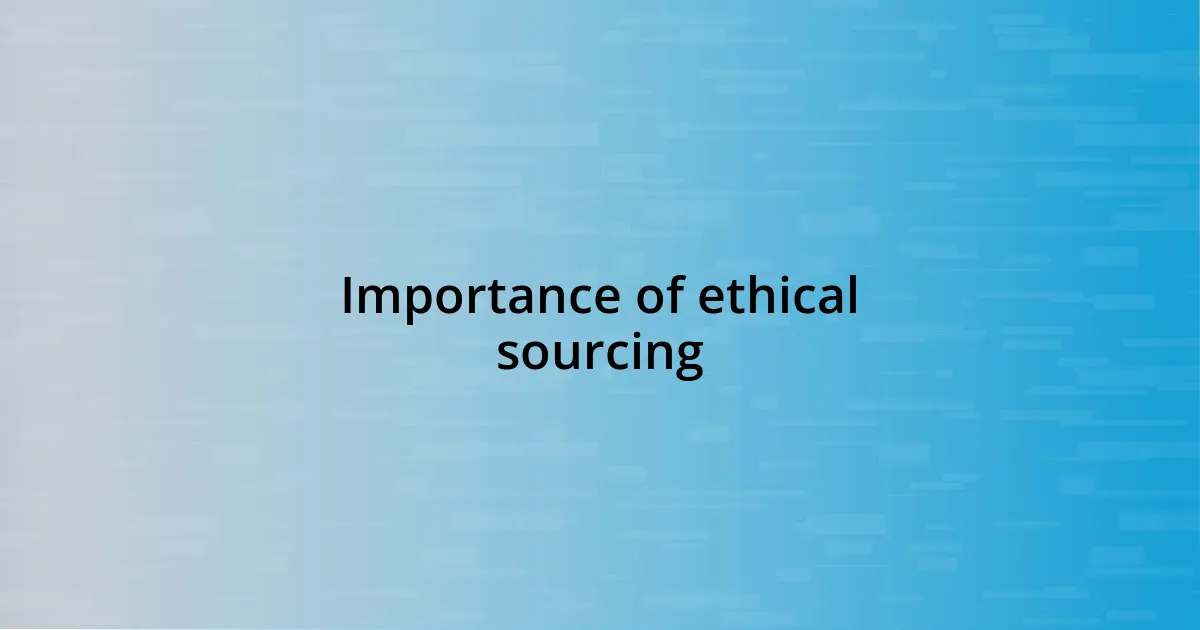
Importance of ethical sourcing
The significance of ethical sourcing cannot be overstated. When companies actively engage in ethical sourcing, they not only safeguard human rights but also protect the environment. I know a friend who prefers to buy only from brands with transparent supply chains; she feels more connected to the products she uses. It’s heartwarming to see how mindful choices can inspire a sense of community and accountability.
Furthermore, ethical sourcing improves brand loyalty and customer satisfaction. In my own experiences, I’ve often chosen to support businesses that share my values. It brings me joy to pay a little extra for items I know are crafted with care and responsibility. This kind of intentional buying behavior fosters stronger relationships between consumers and brands, turning transactions into shared missions for positive change.
Finally, ethical sourcing helps organizations mitigate risks related to labor practices and raw materials. I once attended a seminar where an expert discussed how companies can face severe backlash for unethical practices. It made me realize that while the initial investment in ethical sourcing might be higher, the long-term benefits, including reputation management and customer trust, are invaluable. Isn’t it reassuring to know that the brands we support can have such a profound impact on the world?
| Benefits of Ethical Sourcing | Impact on Society |
|---|---|
| Builds consumer trust | Promotes fair labor practices |
| Enhances brand loyalty | Supports local economies |
| Reduces supply chain risks | Encourages environmental sustainability |
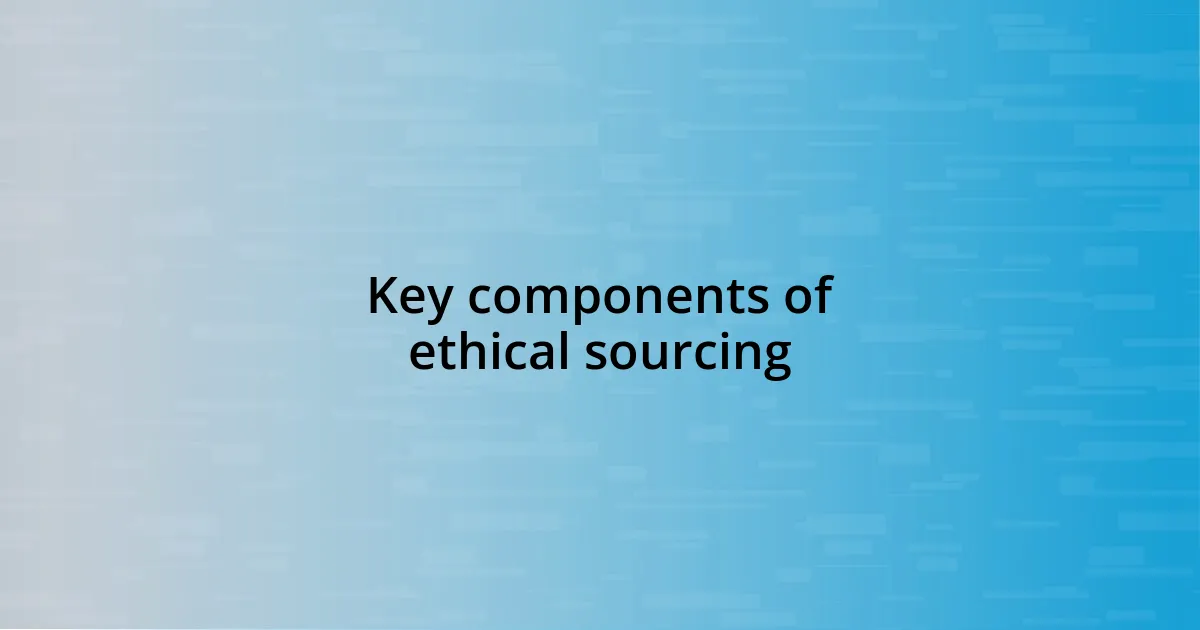
Key components of ethical sourcing
When I reflect on the key components of ethical sourcing, several essential elements come to mind. Transparency is crucial; it’s about knowing where materials come from and who is behind the production. I remember a time I reached out to a brand about their sourcing practices, and the detailed, thoughtful response they provided made me feel valued as a customer, reinforcing my connection to their mission.
Key components of ethical sourcing include:
- Fair Labor Practices: Ensuring that workers receive fair wages and safe working conditions.
- Environmental Sustainability: Committing to practices that reduce harm to ecosystems.
- Supply Chain Transparency: Providing clear information about sourcing processes and origins.
- Community Impact: Supporting local businesses and artisans, contributing to economic sustainability.
- Continuous Improvement: Striving for better practices over time, rather than just meeting minimum requirements.
Each of these elements plays a vital role in shaping a brand’s identity and commitment to responsible sourcing. I recall noticing how a company I support aligned its values with community development initiatives, which deepened my appreciation for their products. It’s heartwarming to see this ethical commitment reflected not only in their goods but also in the positive impact on various communities.
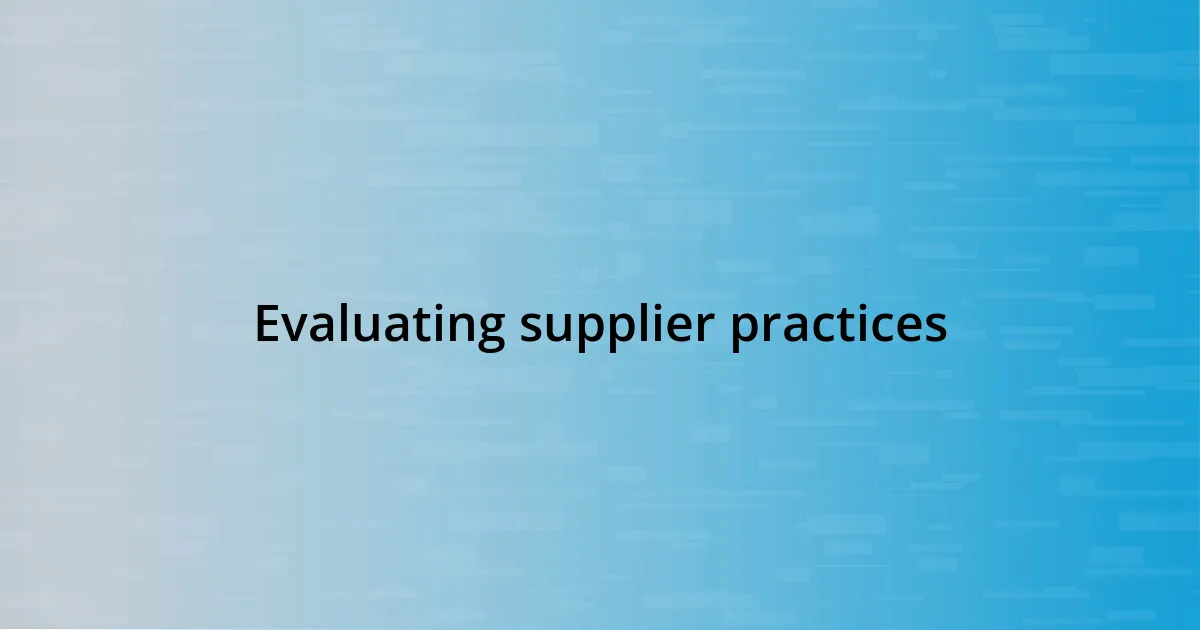
Evaluating supplier practices
When I evaluate supplier practices, I focus on several core aspects. Firstly, I assess whether suppliers adhere to fair labor standards. For instance, I once visited a small textile workshop that proudly displayed certifications proving their commitment to fair wages. Seeing the workers smiling as they crafted beautiful fabrics made me realize how much of a difference ethical practices can make in their lives.
Another crucial element I consider is the suppliers’ approach to sustainability. I vividly remember attending a local eco-fair where a supplier showcased their process of using recycled materials. The stories behind those materials were compelling; they spoke of reducing waste and protecting wildlife. This made me think, how often do we consider the life cycle of the products we buy? Understanding a supplier’s environmental footprint enriches my appreciation for quality craftsmanship and responsible sourcing.
Lastly, communication and transparency play pivotal roles in evaluating supplier practices. I’ve had experiences where brands were open about their sourcing methods, and it left a lasting impression on me. I remember chatting with a representative from a coffee brand who shared their direct trade model, ensuring farmers were treated fairly. That conversation truly highlighted the power of dialogue in building trust and authenticity in sourcing. So, when assessing suppliers, I ask myself: Are they willing to share their story with me?
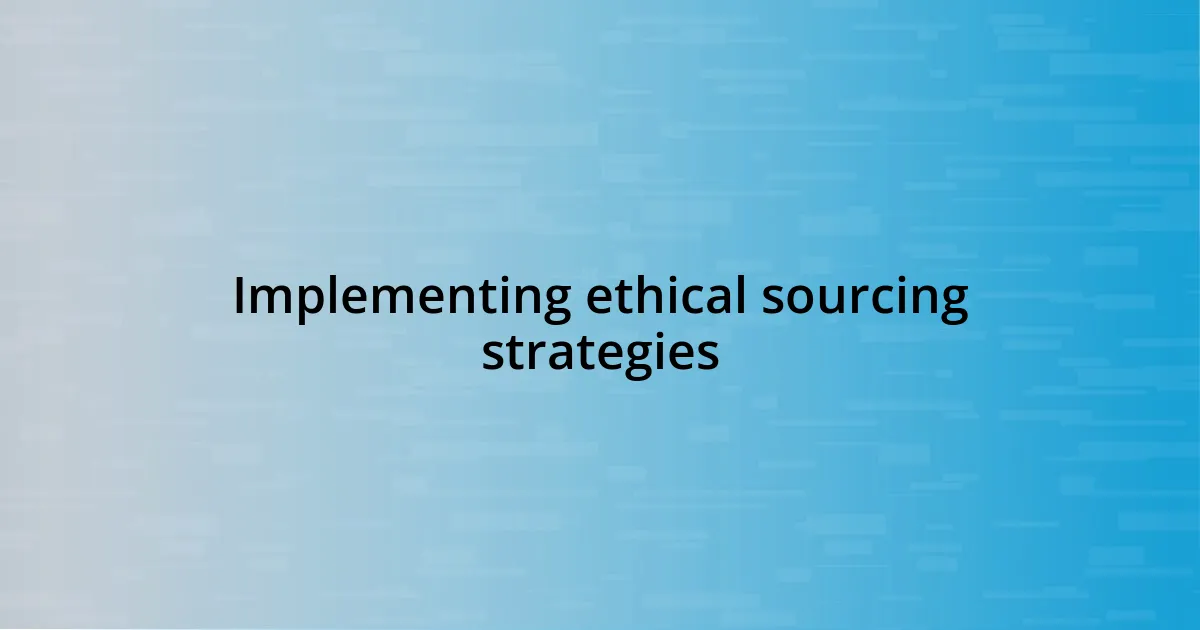
Implementing ethical sourcing strategies
Implementing ethical sourcing strategies requires a thoughtful approach that goes beyond surface-level compliance. One aspect I find essential is building strong relationships with suppliers who share my values. I remember a partnership I cultivated with a local organic farm; the personal stories shared about their farming practices and the people involved created a strong sense of community. This relationship not only fostered trust but also made the sourcing feel meaningful. Who wouldn’t want to support a supplier with such passion and purpose?
Moreover, training and educating employees about ethical sourcing can be tremendously impactful. A few years back, I participated in a workshop where we discussed the importance of these policies. The collective realization about our role in ethical sourcing sparked a genuine commitment among my colleagues and me. It made me wonder: how many employees are truly aware of the sourcing journey of their products? Empowering them with knowledge can transform how they engage with suppliers and customers alike, leading to more conscious decisions.
Finally, setting measurable goals for ethical sourcing can help in tracking progress and accountability. I’ve observed that brands that commit to specific targets often inspire confidence among consumers. For instance, when a clothing company I follow established a timeline for reducing their carbon footprint, I felt excited about their commitment to positive change. It raises the question: what could every organization achieve if they set clear, actionable goals around ethical sourcing? Each small step matters and contributes to a larger shift toward responsibility in the industry.
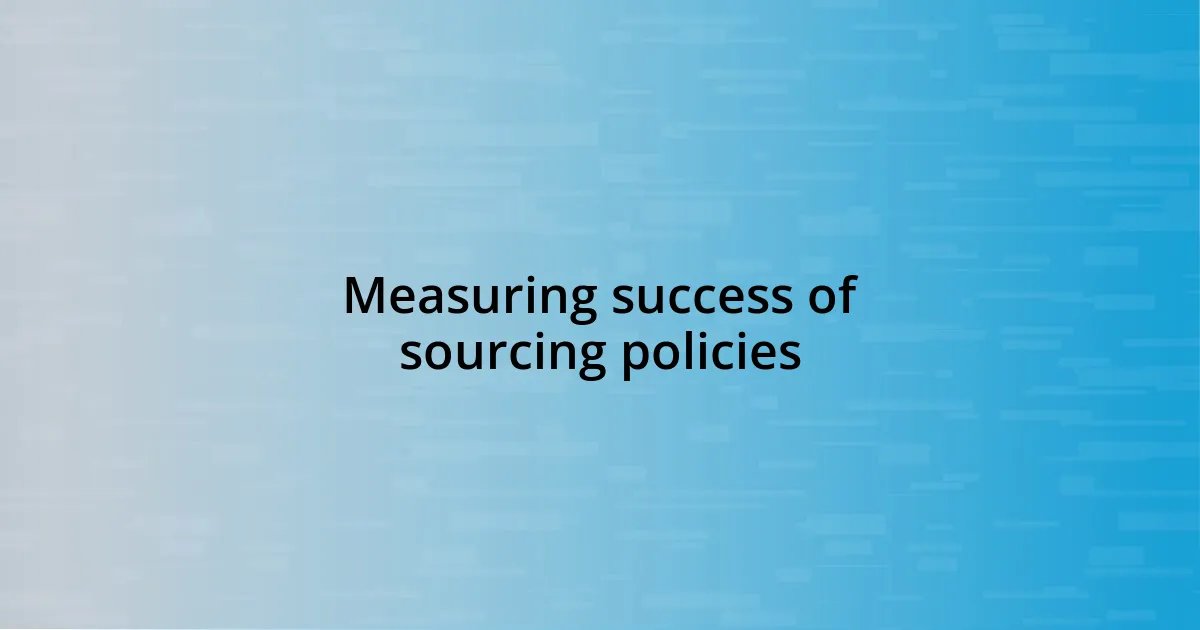
Measuring success of sourcing policies
Measuring the success of sourcing policies is not just about checking boxes; it’s about the impact those policies have in the real world. I once collaborated with a brand that implemented a supplier feedback system. After gathering insights from workers directly, they discovered that addressing minor concerns led to improved morale and productivity. It made me reflect on how often businesses miss the opportunity to truly listen to the voices of those involved in production.
Another important metric I consider is consumer engagement with the brand’s ethical initiatives. I remember discussing sustainable sourcing with friends and realizing how aware they were of brands that actively share their practices. When a company proudly showcases their commitment to ethical sourcing, it sparks interest and loyalty among consumers. I can’t help but wonder, how do we measure the emotional connection that consumers develop with brands that prioritize ethics?
Lastly, financial performance is often a critical indicator of success. I’ve witnessed companies grow significantly after they shifted to ethical sourcing—one fashion label, in particular, saw a remarkable increase in sales after they highlighted their sustainable materials. This raises the question: can profit and principle coexist, and if so, what’s stopping more brands from embracing this harmony? It’s these kinds of results that truly illustrate the potential of ethical sourcing to drive both purpose and profit.
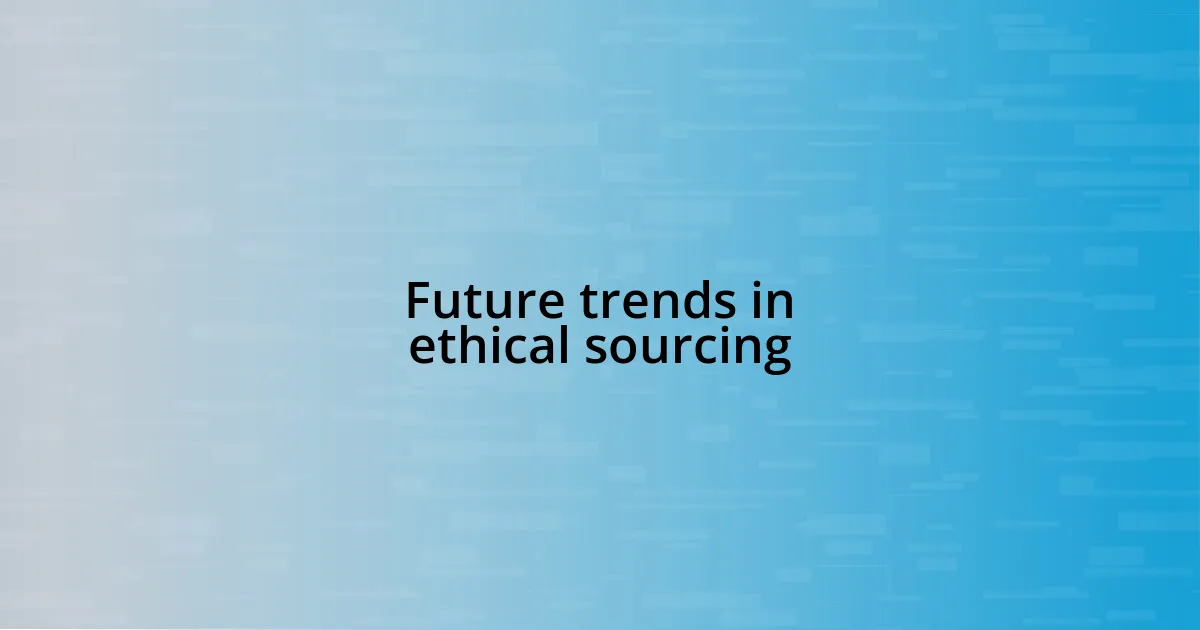
Future trends in ethical sourcing
As I look towards the future of ethical sourcing, one trend that stands out is the increased integration of technology. Imagine utilizing blockchain to trace every step of a product’s journey from farm to shelf! I had the chance to attend a tech conference where several startups showcased how this innovation can enhance transparency. The idea made me think about how much more trusting consumers could be if they could easily verify sourcing claims.
Moreover, collaboration between brands is something I see becoming more prevalent. I recall a remarkable panel discussion I attended where companies joined forces to advocate for better labor practices in their supply chains. The energy in that room was palpable! It really drove home the idea that when businesses unite for ethical purposes, they can amplify their impact. It raises an important question: how much change can we create together when we share resources and knowledge?
Lastly, consumer demand for ethical practices continues to grow, greatly shaping sourcing policies. I remember a casual dinner conversation that turned into a passionate debate about a brand’s sourcing methods—everyone had strong opinions! This conversation highlighted that consumers are becoming more vocal than ever about their values. Are companies ready to listen and evolve? I believe this shift will prompt brands to not just comply with ethical sourcing but to embrace it as a core part of their identity.


